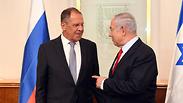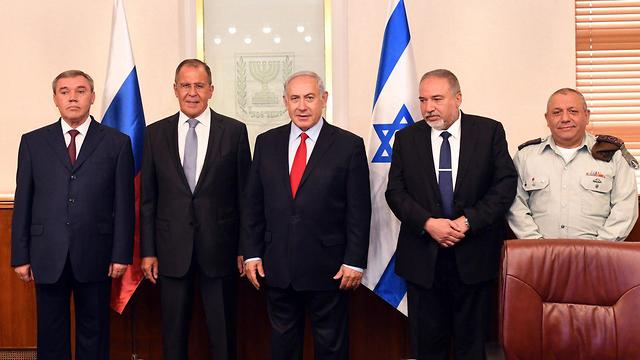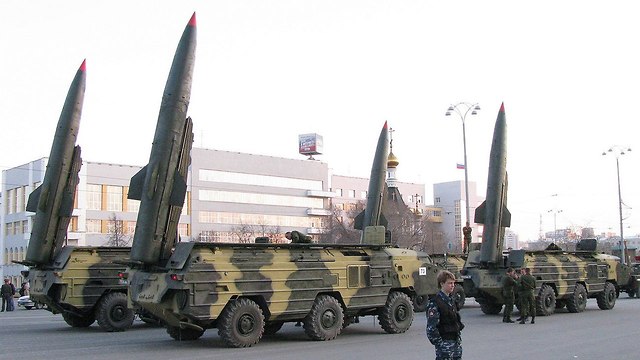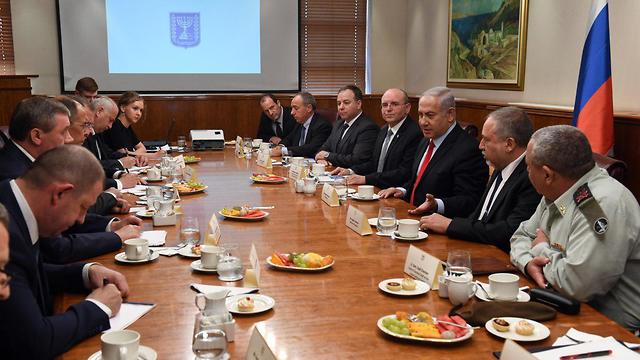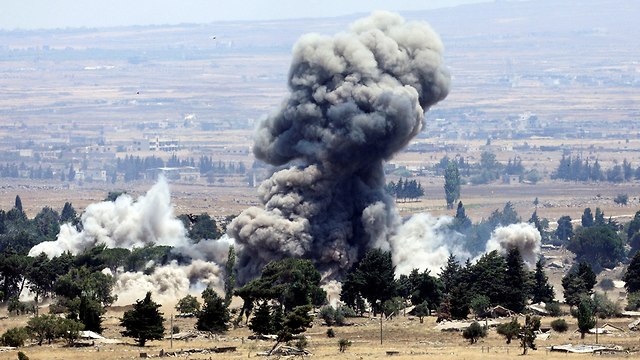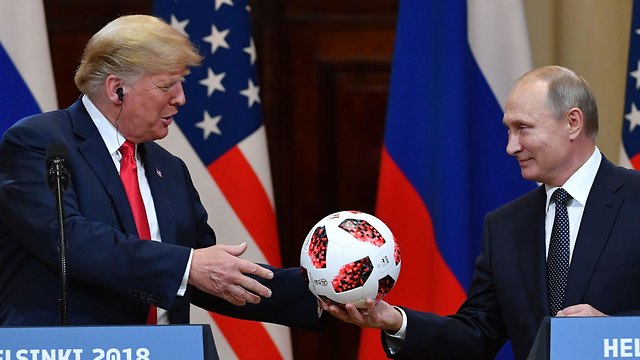
The card in the hands of Netanyahu and Eisenkot
Analysis: The meeting between Russian Foreign Minister Sergey Lavrov and Prime Minister Netanyahu in Israel on Monday indicates that President Putin understands that Israel will continue to actively oppose the Iranian defence establishment and subsequently Assad’s full recapture of the Golan Heights and southern provinces.
What is still unclear on the strategic level is Israel's demand to prevent an Iranian establishment of a military presence. Another issue is the necessary security arrangements in light of the inevitable recapture of the Syrian Golan Heights and takeover of the Quneitra province by Assad’s army.
The fact that there are no detailed arrangements regarding the Golan is really troubling for Israel, which is why the IDF has recently increased activity in both the Golan Heights and in the rest of Syria.
The goal is to make it clear to the Russians and to Assad that as long as a detailed agreement on the Golan Heights is not reached, and a deal between the Russian and the Syrians isn’t struck to promise the withdrawal of the Iranian forces from Syria—Israel will continue to interfere with Assad’s attempts to take full control of the Golan Heights and will respond to any violation of the 1974 separation agreements.
Israel is especially concerned by the presence of Shi'ite militias, such as Hezbollah and Iranian Revolutionary guards, among the Syrian army units that are currently advancing towards the Quneitra province and other areas in the Syrian Golan Heights. This is a direct contradiction to Putin's promise to Netanyahu, and apparently to President Trump as well, to keep Iranian forces at least 100 km from the Golan.
The fact that the Syrian army has Shi'ite militia embedded in its ranks is well known to the Israeli intelligence, and apparently it was the reason for Netanyahu's phone call to Putin a few days ago, and perhaps, even for the firing of David's Sling interceptor missiles on Monday.
The Syrian SS-21 missiles, with a relatively accurate warhead weighing half-a-ton, were apparently aimed at the ISIS enclave on the border triangle between Israel and Jordan and Syria, but the missiles’ trajectory indicates they might have been aimed at the Israeli territory.
The commander of the David's Sling system decided to intercept them and it can certainly be assumed that he did not have a problem receiving an approval for launching the interception, partly due to Israel’s assessment that the Syrians would try to avenge the attack in the alleged IDF airstrike in the country a day earlier.
Another reason might have been that it was important for Israel to once again underline that it will not allow the Syrians to violate the 1947 separation agreements, and will not allow the Iranian forces operating in the country to enter the Golan Heights territory.
The Russian promise to Israel regarding Iran was made in order to avoid Israeli intervention in Assad’s attempts to take full control of the Golan Heights and southern Syria along the border with Jordan, but, Israel understands that the Syrians are being deceptive, and it does not intend to ignore it.
Israel also demands that Syrian rebels from the Golan Knights group will be allowed to stay in the demilitarized zone between the Israeli and the Syrian border on the Golan Heights, but only as a civilian organization.
It also became clear to Israel that the Iranians seem to be ignoring the Russian promises and Assad has allowed them to become entrenched in his army. Therefore it’s safe to assume that Israel has informed the Russians that it will not allow Assad to recapture the Golan Heights, which is what has brought Russian Foreign Minister Sergey Lavrov and Russian Chief of Staff Valery Gerasimov to Tel Aviv on Monday.
In fact, Israel is not only demanding the re-implementation of the 1974 separation agreement, but also the return of the UN forces who fled the area when the revolt against Assad began. More importantly, it wants guarantees that there will be a detailed arrangement that will prevent the Shiite militias operating under the orders of the Revolutionary Guards from approaching the Israeli border.
In addition, Israel is demanding, in principle and in practice, that no Iranian missiles or defense systems be allowed to remain in Syria, especially anti-aircraft missile systems—that would endanger Israel's airspace and freedom in to act in the skies. Therefore, Israel demands the extraction of Iranian forces from all of Syria and just 100 kilometers from the Israeli border.
Israel has shown its willingness to agree to Assad's re-establishment of his rule throughout Syria, including the Syrian side of the Golan Heights. But only on the condition that the Iranians are forbidden from establishing a long-term military presence in Syria. This is a card that Israel will try to take advantage of.
Israel has also demanded that the Iranians must not be allowed to take control of the border crossings between Iraq and Syria, which will allow them to maintain a land corridor from Tehran through Iraq, Syria, and from there to Lebanon.
It is especially important for Israel that the Iranians and their proxies do not take control of the city of Abu Kamal (Bukhmal), located on the Euphrates river, and in fact controls the main border crossing between Iraq and Syria and the main road leading to Damascus.
All of this will not only allow the Iranians to supply weapons to Hezbollah but also to establish a unified front against Israel on Syrian soil.
This was not something that Putin was willing to promise to Netanyahu or to President Trump. The US president apparently did not understand the trick that the Russian leader played when he was told that Russia, too, wanted to remove Iran from Syria, but at the moment it is not practical.
Israel wants a promise from both the Syrians and the Russians that Iran will not be allowed to establish a military presence in Syria and will leave their stronghold in Abu-Kamal.
The arrival of the somewhat alarmed Lavrov and Chief of Staff Gerasimov on Monday attests to the fact that the Israeli threat is understood well in Moscow, because it is very important for Putin to allow Assad to take control of all of Syria in order to reach a political settlement that would end the ongoing civil war. At the sme time, Assad himself wants to recapture the Golan Heights and southwestern Syria as a symbolic act that would represent his victory.
As mentioned earlier, Prime Minister Netanyahu and Chief of Staff Eisenkot will try to take full advantage of the card they’re holding in order to reach a detailed written agreement that will be binding for all sides and will prevent a new front being established along the Syrian border similarly to the current situation in Lebanon.
This is what the State of Israel wants to prevent, and this is apparently the real reason for the talks with the Russians.













